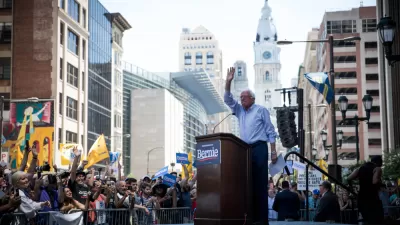Watching Wednesday's Democratic debate between Hillary Clinton and Sen. Bernie Sanders, I was startled to hear Clinton claim that Sanders said he would delay Obama's Clean Power Plan rule. PolitiFact investigated, though the result wasn't clear-cut.
The Clean Power Plan is President Barack Obama's signature climate initiative, so when I heard Clinton proclaim during Wednesday's (March 9) Washington Post-Univision Democratic debate in Miami, "The Clean Power Plan is something that Sen. Sanders has said he would delay implementing," I suspected there might be something she wasn't telling us. Fortunately, PolitiFact saved me from searching through the web for what it might be.
"We searched Google, LexisNexis and CQ for comments Sanders has made on the plan and found no evidence that Sanders has said he wants to delay the implementation," writes Linda Qiu of PolitiFact. "The Clinton campaign referred us to Sanders’ Feb. 21 interview with Grist, an environmental online magazine."
Now PolitiFact rates Clinton's charge as "false," but in reading the Grist piece, which is based not on Sander's position on climate change but what Sanders would do "to halt fracking not just on public land but on private land too," and two articles based on that interview appearing in The Hill and LegalPlanet, I understood Clinton's charge, though as I suspected, she omitted a major part of Sander's position on the Clean Power Plan.
In that interview with Grist's Ben Adler, Sanders indicated "six significant executive actions that a President Sanders would likely take to put the squeeze on fracking and natural gas," including:
- "Change the Clean Power Plan to incentivize renewables instead of (natural) gas.
- "Regulate methane, not just carbon, through the Clean Power Plan."
In response, Richard L. Revesz, dean emeritus and a professor at New York University School of Law, blogged in The Hill:
It is [...] troubling that Democratic presidential candidate Sen. Bernie Sanders (Vt.) has been reported as advocating changing the Clean Power Plan to also regulate methane emissions that result from fossil fuel extraction. The Clean Power Plan cannot be changed at the stroke of the pen. Just as the Republican presidential candidates could not accomplish their stated goal of repealing various regulations on their first day in office, neither can such regulations be strengthened instantaneously...
Similarly, Ann Carlson of the UCLA School of Law, writes in LegalPlanet:
Revising the Clean Power Plan would cause significant delay in its implementation simply because of the procedural requirements of notice and comment ..... [Emphasis added]
Clinton really just restated what Professor Carlson wrote last month, almost word-for-word, in fact, about how Sanders anti-fracking platform would jeopardize the country's most important climate initiative, though Sanders never said he would delay its implementation. Carlson added that Sander's "strategy also raises pretty starkly the dilemma raised by a strategy that elevates principle over pragmatism," perhaps validating one of Clinton's campaign themes.
Last word goes to Grist writer Ben Adler, whose Feb. 21 article is the source of the confusion, writes on March 11 that Clinton's charge "turns out to be a misleading interpretation of a very different Sanders proposal — one first reported by me."
FULL STORY: Hillary Clinton wrongly says Bernie Sanders wants to delay the Clean Power Plan

Alabama: Trump Terminates Settlements for Black Communities Harmed By Raw Sewage
Trump deemed the landmark civil rights agreement “illegal DEI and environmental justice policy.”

Planetizen Federal Action Tracker
A weekly monitor of how Trump’s orders and actions are impacting planners and planning in America.

The 120 Year Old Tiny Home Villages That Sheltered San Francisco’s Earthquake Refugees
More than a century ago, San Francisco mobilized to house thousands of residents displaced by the 1906 earthquake. Could their strategy offer a model for the present?

In Both Crashes and Crime, Public Transportation is Far Safer than Driving
Contrary to popular assumptions, public transportation has far lower crash and crime rates than automobile travel. For safer communities, improve and encourage transit travel.

Report: Zoning Reforms Should Complement Nashville’s Ambitious Transit Plan
Without reform, restrictive zoning codes will limit the impact of the city’s planned transit expansion and could exclude some of the residents who depend on transit the most.

Judge Orders Release of Frozen IRA, IIJA Funding
The decision is a victory for environmental groups who charged that freezing funds for critical infrastructure and disaster response programs caused “real and irreparable harm” to communities.
Urban Design for Planners 1: Software Tools
This six-course series explores essential urban design concepts using open source software and equips planners with the tools they need to participate fully in the urban design process.
Planning for Universal Design
Learn the tools for implementing Universal Design in planning regulations.
Clanton & Associates, Inc.
Jessamine County Fiscal Court
Institute for Housing and Urban Development Studies (IHS)
City of Grandview
Harvard GSD Executive Education
Toledo-Lucas County Plan Commissions
Salt Lake City
NYU Wagner Graduate School of Public Service





























